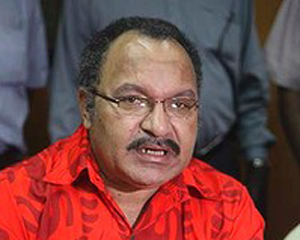
PORT MORESBY (The National (PNG) / Pacific Media Watch): Prime Minister Peter O’Neill last night announced that Papua New Guinea was in a constitutional crisis, one created by the continuing stand-off between Parliament and the judiciary.
And in reaction to Tuesday’s Supreme Court decision to negate the effects of the judicial conduct law in its entirety, he said Parliament would now invoke its oversight powers.
Both actions – the incursion into Parliament’s powers to make laws by the Supreme Court and O’Neill’s threat to invoke oversight powers – have no precedence.
While O’Neill did not specify how the oversight powers might be applied, it is most likely that Parliament will use it to overturn the Supreme Court decision.
Oversight powers give Parliament its exclusive access to law-making rights.
Although Parliament was adjourned yesterday to next Tuesday on account of there being no quorum, it could even sit today to deal with the urgent matter.
In a statement signed by acting National Executive Council secretary Chris Haiveta, O’Neill said: “I am sad that Papua New Guinea is now in a constitutional crisis, a crisis between the judiciary and parliament. I am not aware of any jurisdiction in the Commonwealth where judges have taken a stand directly against Parliament.
Chief justice impeached
“In the Philippines today, we have a situation where their chief justice is being impeached before the senate.
“Why is our chief justice refusing to step aside to clear his name?
“Judges cannot just do what they like anymore than other citizens can. It is a time-honoured principle of law that justice must not only be done, but that it must also be seen to be done. That is why judges traditionally err on the side of caution and disqualify themselves when there is even the slightest scope for a suggestion of bias.
“Judges often, and quite properly, stand aside from cases to avoid the public perception of bias, even when there is no actual bias.
“They do so to protect the integrity of the courts.”
His statement inferred that Chief Justice Sir Salamo Injia had knowingly breached the standards of natural justice. O’Neill described it as a “breach of faith with the people”.
He said there could be no “greater assault upon the Constitution and the national justice system”.
“It is for this reason that serious criminal penalties are called for, and the bill provides them,” he said.
“The judiciary does not have unlimited powers. It is subject to laws made by Parliament.
“It is incumbent upon my government now to ensure parliament will exercise its responsibility in safeguarding the checks and balances enshrined in our Constitution between all three arms of government.”
[PMW editor's note: The National has not balanced this single-sourced story].
'Big Man' politics in Melanesia
This work is licensed under a Creative Commons Attribution-NonCommercial 3.0 New Zealand Licence.




